‘Each day it is getting worse’: Fighting to save lives on Ukraine’s bloodiest battlefield
Scarred by relentless attacks, the eastern city of Bakhmut has become the epicentre of Russia’s war. Bel Trew meets the firefighters and medics who brave the horrors of war each day to help its victims

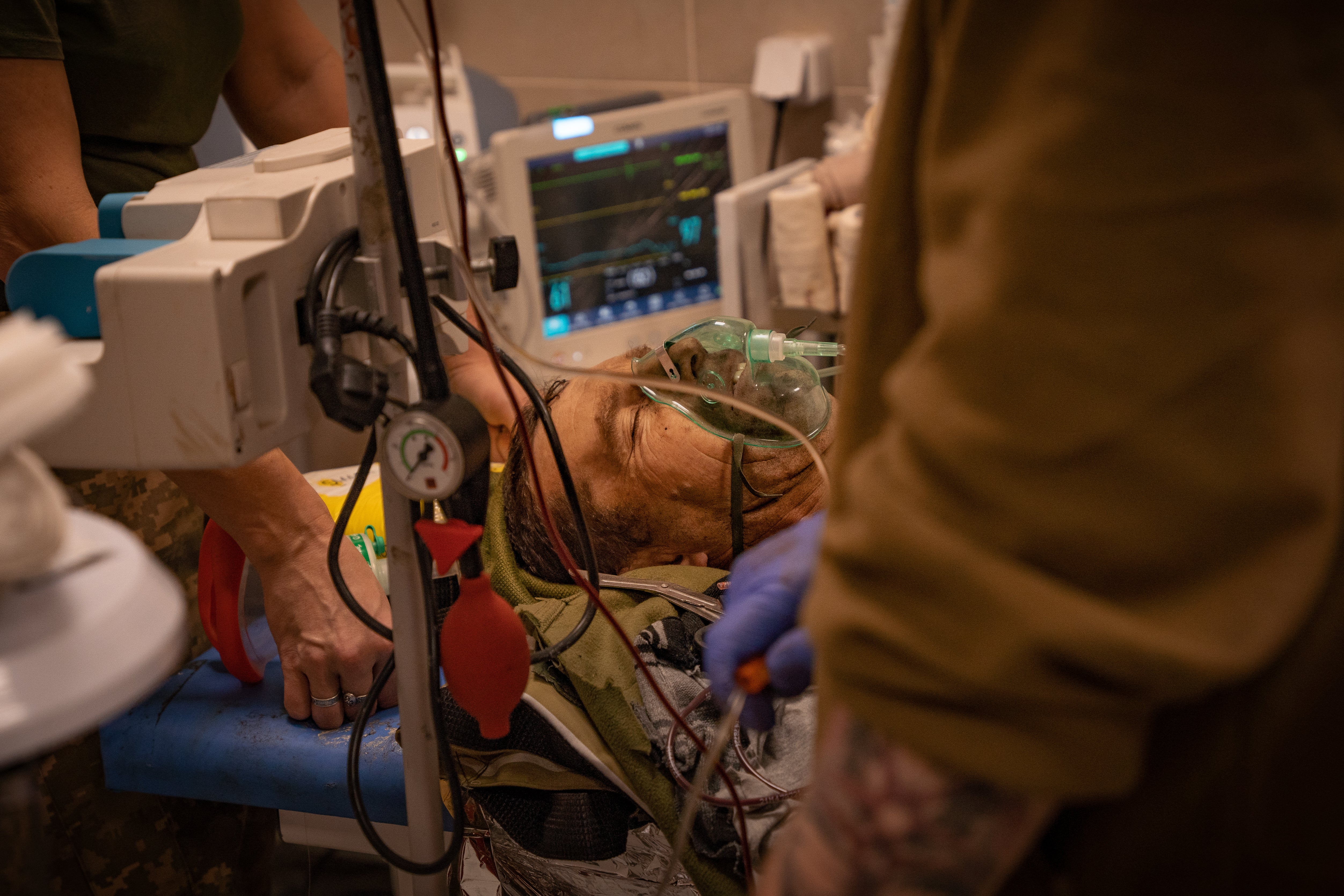
Your support helps us to tell the story
From reproductive rights to climate change to Big Tech, The Independent is on the ground when the story is developing. Whether it's investigating the financials of Elon Musk's pro-Trump PAC or producing our latest documentary, 'The A Word', which shines a light on the American women fighting for reproductive rights, we know how important it is to parse out the facts from the messaging.
At such a critical moment in US history, we need reporters on the ground. Your donation allows us to keep sending journalists to speak to both sides of the story.
The Independent is trusted by Americans across the entire political spectrum. And unlike many other quality news outlets, we choose not to lock Americans out of our reporting and analysis with paywalls. We believe quality journalism should be available to everyone, paid for by those who can afford it.
Your support makes all the difference.The moment the firefighters got the call that central Bakhmut had been hit by a massive Russian artillery strike, another rocket ripped open the sky, landing less than a metre from their station and trapping the only people who could help the frontline Ukrainian city.
With the street ablaze outside, and the gates mangled shut, the first responders had to use their fire engines to ram through the metal shutters to get out.
“The only way was to drive through fire to get to the other fire,” says Major Yuriy Galich, the 37-year-old department chief, intermittently interrupted by the sound of shelling.
“And each day it is getting worse. Last week we got 10 separate calls about 10 different fires happening simultaneously but again, we couldn’t even get out of the station. Like so many days, if we had left we would have been instantly killed.”
The fire department of the eastern city of Bakhmut – depleted in numbers and in fire trucks – is one of the few remaining forces protecting residents.
The firefighters now not only put out blazes but also have an ambulance and give life-saving first aid. They do evacuations and medical transfers to nearby key cities, all while under intense bombardment themselves. At the moment they are operating with only two fully functioning fire trucks, compared with eight before the war.
This is because Bakhmut, once a city of 80,000 people but now home to about 10,000, and the nearby town of Soledar, have become the epicentre of Russia’s bloody invasion of Ukraine.
The city hailed by the president
As Vladimir Putin loses ground in the north and south, the east has become the focus of Moscow’s fury, and the area is an invaluable gateway to the rest of the strategic Donbas region. If Russia gained control of Bakhmut and Soledar it would give Moscow a stepping stone to advance on two of the bigger cities, Kramatorsk and Slovyansk. It would also deprive Ukraine of a vital road and rail supply line intersection.
And so, this key area has been pounded by Russia for five months, leaving a landscape pockmarked by shelling. On the ashen road into Bakhmut, most of the sporadic traffic comprises tanks and military cars, while the city’s buildings bear the scars of the months-long bombardment. Across the river which splits Bakhmut in two, Russian snipers have started taking potshots at civilians.
Against that backdrop, residents on bicycles pick their way through the ruins on the hunt for supplies. They barely flinch when shells land deafeningly close, sending smoke into the fog and ash and dust.
In one day we can treat up to 100 people. Soldiers, civilians, everyone from children to the elderly
This battle for Bakhmut, a town that has held on since May, has morphed into a symbolic battle of Ukraine’s entire fight for survival. So much so that Volodymyr Zelensky mentioned the city – calling it “the fortress of our morale” – during a speech in Washington DC on Wednesday on his first trip outside of Ukraine since Moscow invaded in February.
It followed his recent visit to Bakhmut where he said that the only reason the east had been holding out was because Bakhmut was fighting back.
“In fierce battles and at the cost of many lives, freedom is being defended here for all of us,” he wrote in a social media post.
And that bitter battle continued this weekend with Russian forces, backed by mercenary groups such as Wagner, pounding Ukrainian positions in an attempt to edge forwards.
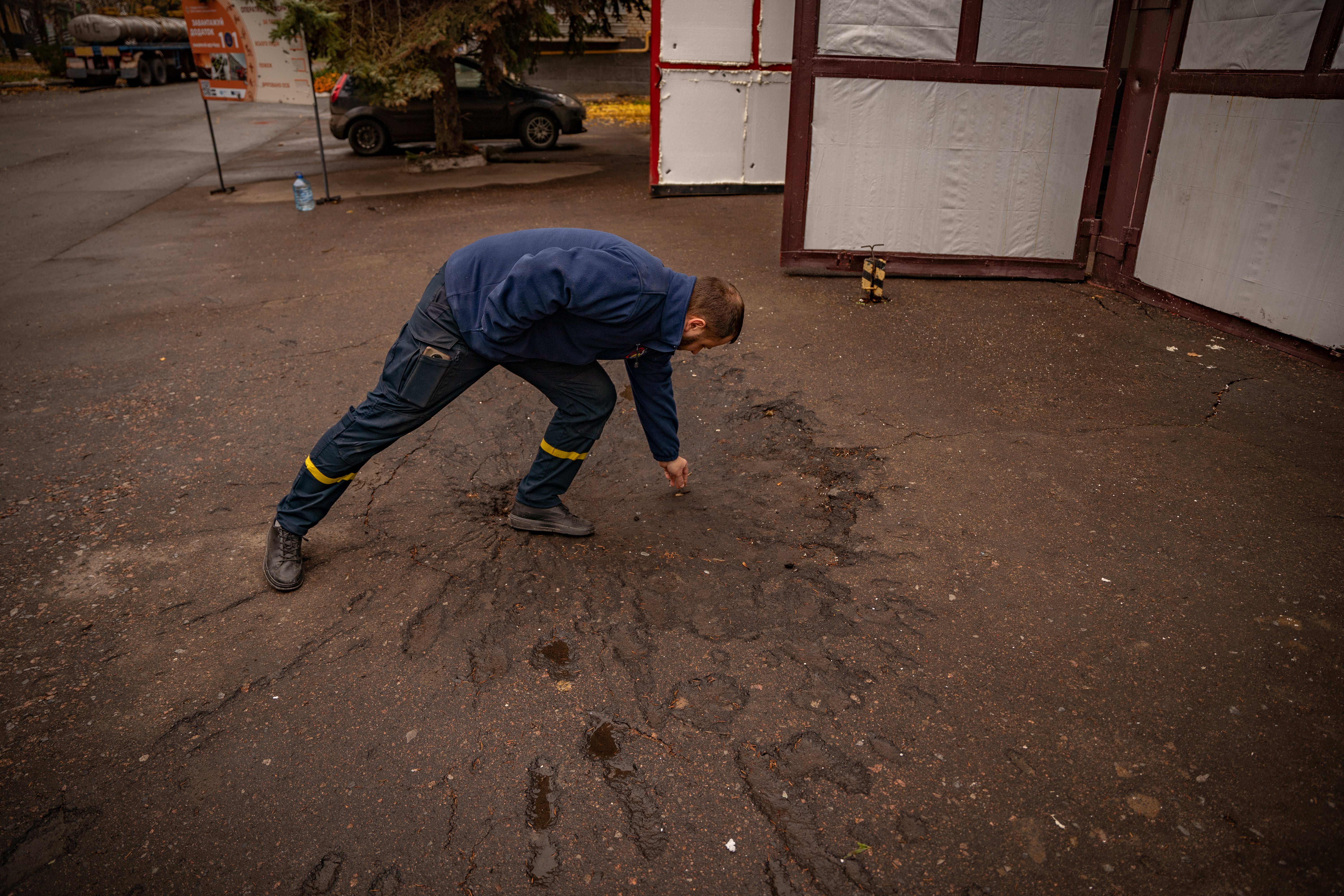
The commander of Ukraine’s “Freedom” battalion, Petro Kuzyk, helping to defend the city, said this week the fighting had been so intense every day the Russians launched “anywhere from seven to 10 attempts to storm our positions”.
Back at the fire department, Major Galich, who has been in the job for 15 years, knows that means even deadlier missions for his teams. They have already lost one firefighter, a young man called Ilya who was killed in the autumn just a few weeks after he had signed up. He was trying to check a building that had just been hit when shelling rained down again.
“We tried so many times to get to him but the shelling was so hard we couldn’t get there,” Galich adds with a swallowed pause.
“He was dying and we just couldn’t save him. That was probably the worst moment of the war.”
A race against time
Work here is like a conveyor belt, Kroha, a volunteer medic, says wearily, as a military ambulance arrives. Suddenly everyone is frantic. Paramedics spill out of the khaki vehicle clutched around a blood-soaked stretcher. More doctors melt out of the walls to meet them in the doorway.
One of the soldiers being brought in was critically wounded nearby. Against his cries, the teams start to treat him with that weathered silence of experience.
This is a field hospital located close to both Bakhmut and Soledar. The Independent has been asked not to reveal its exact position for fear it might be targeted.
Russia has repeatedly bombed hospitals and medical facilities over the war. The 14-person team at this clinic are concerned they could be next.
“You can hear when there will be work because it comes after there are strong explosions,” Kroha continues grimly, with three bloody stretchers propped up behind her: the detritus from this morning’s influx.
“The only thing is to evacuate the guys in time. But sometimes it is not even possible to do that,” she adds.
The 46-year-old, her hair tied back with a scrunchie in the Ukrainian flag colours, gets to work on the newly arrived soldier.
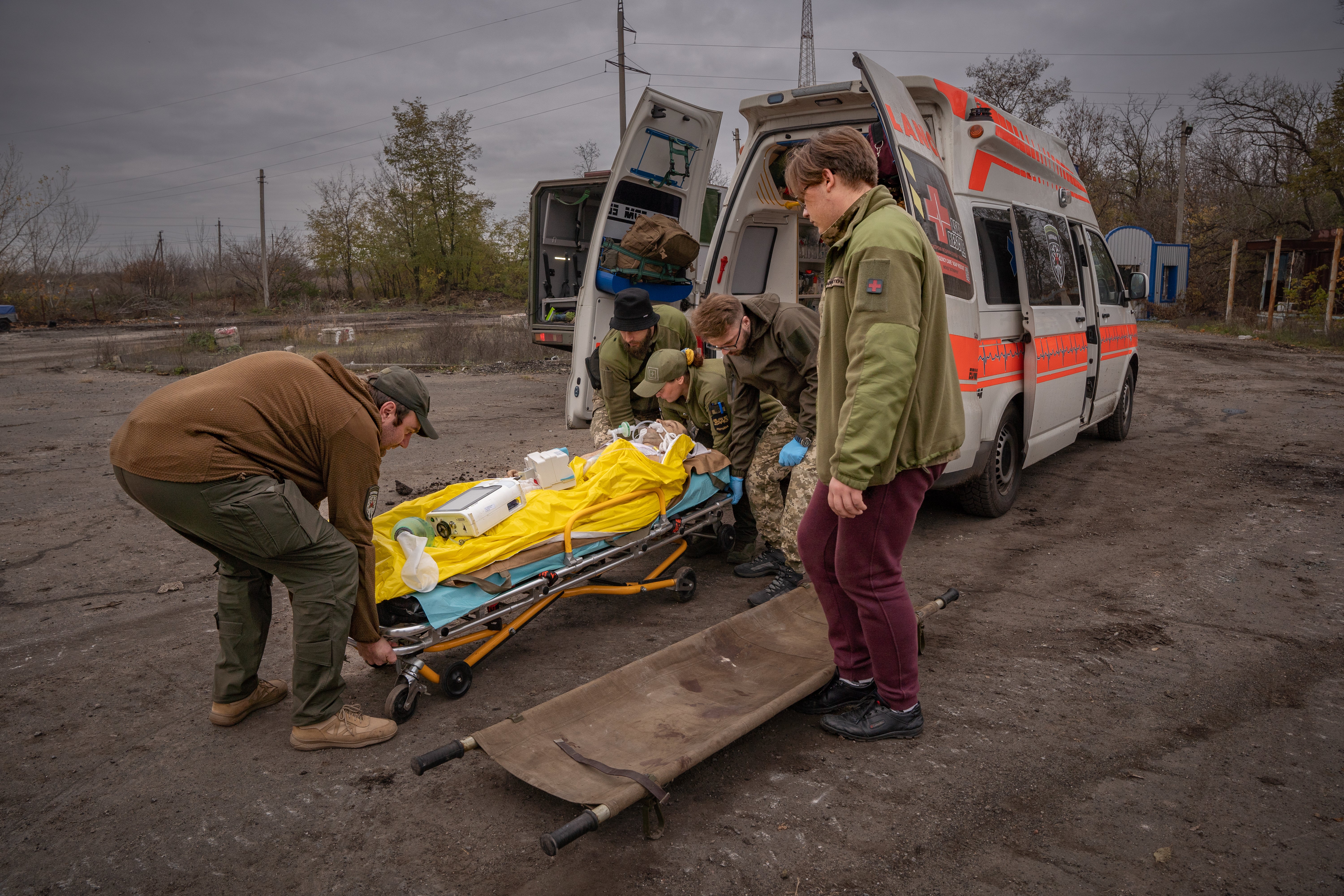
He has a shrapnel wound to his chest that appears to have punctured his lung and is losing a lot of blood. The team fears his lung could collapse.
As he screams in pain, one of the medics bends over his face to comfort him. Kroha grabs his hand, which is jerking involuntarily. They know they have to stabilise him quickly and get him to a safer, better-equipped hospital, via roads which are pitted with missile holes and still being intermittently shelled. Time is running out: a bucket on the floor is slowly filling up with blood.
“I have seen all the traumas you can imagine, men with their guts falling out, open skulls, internal bleeding, people who have lost their legs and hands,” Kroha continues.
Just a few hours before we arrived, she says, they had evacuated someone who had to have his arm amputated because his bones were completely crushed. “At least we managed to save his leg,” she adds quietly.
No time to mourn
Kroha – a diminutive which means “baby” or “crumb” in Russian – is not her real name. It is a codename and an inside joke because at just over 5ft tall she is the smallest member of her team who are all soldiers or members of the territorial defence. The medics here prefer to keep their anonymity. Like thousands of first responders across the country, they are keeping soldiers and civilians alive. And for this fear they could be on Moscow’s wanted lists.
Before the war crashed into Ukraine in 2014, Kroha worked as an assistant notary in a law firm.
What keeps me going? My son gives me strength.
But she felt she could not just sit at home when her television screen was saturated with footage of the conflict that erupted between the Ukrainian military and Russian-backed fighters.
And so she re-trained and was attached to various brigades touring the battlefields. Eight years later, she has been deployed to its bloodiest front. The number of injuries is unprecedented, according to Kroha.
“Between 2014 and 2018, in total I evacuated around 1,200 people. But here I evacuate on average around 1,000 injured people per month,” she says.
“In one day we can treat up to 100 people. Soldiers, civilians, everyone from children to the elderly.”
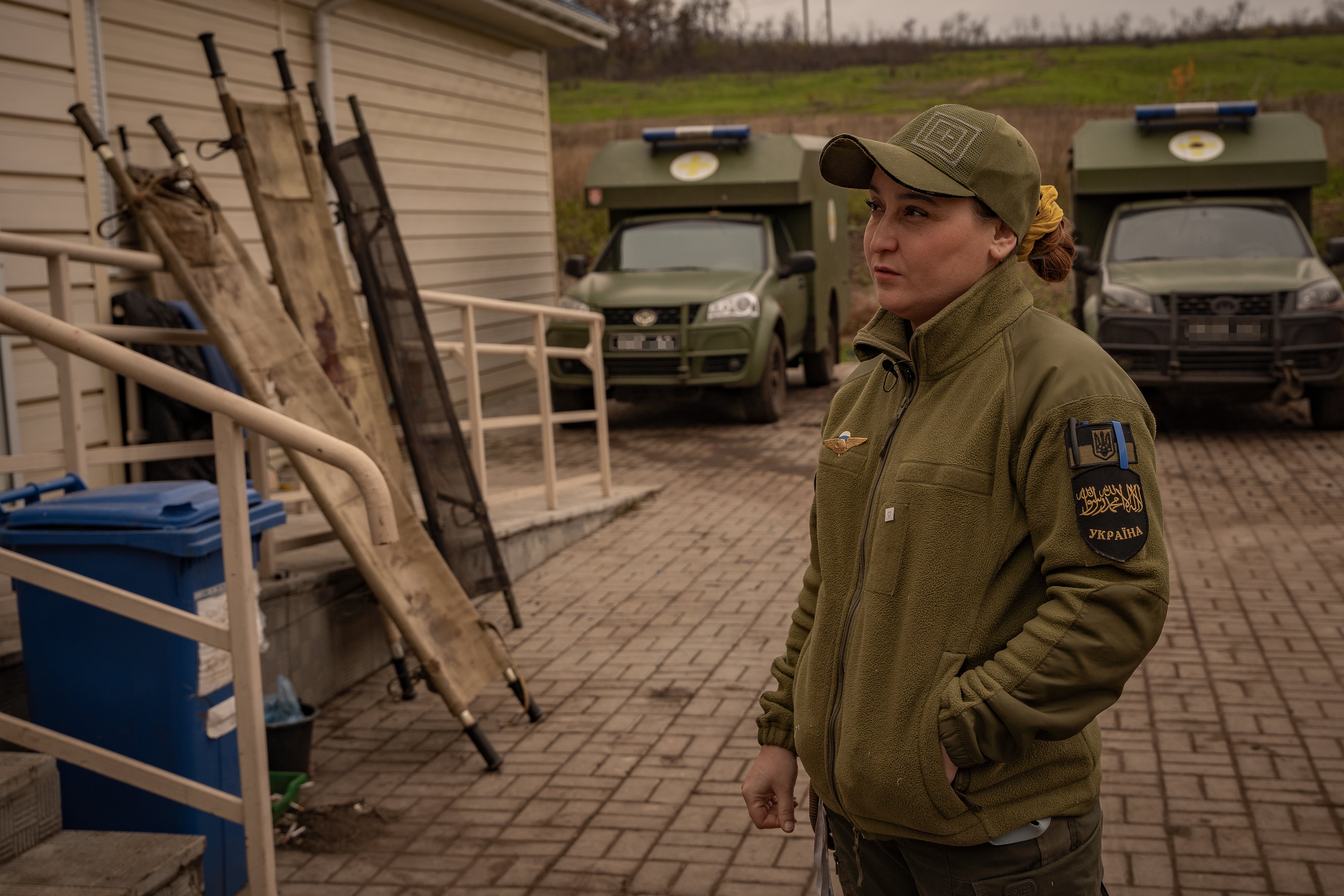
The severity of the wounds has also worsened. In 2014, she says one in 10 injuries would be critical. Now, as the conflict has disintegrated into a bloody artillery battle, Kroha says eight in 10 will be dead by the time first responders can get to them. The rest will be critical.
“It’s becoming harder and harder to evacuate the soldiers. Sometimes we are forced to leave injured people for as long as a day, as the shelling is just so hard,” she adds.
Her words are echoed back in Bakhmut.
There, Nikata, 30, one of the fire crew and a father of a toddler, says often the crews can do nothing but wait until the shelling has calmed down, as artillery fire lands every 10 minutes.
“My home is in the frontline grey zone so I just live here in the fire station now and work,” he adds with exhaustion.
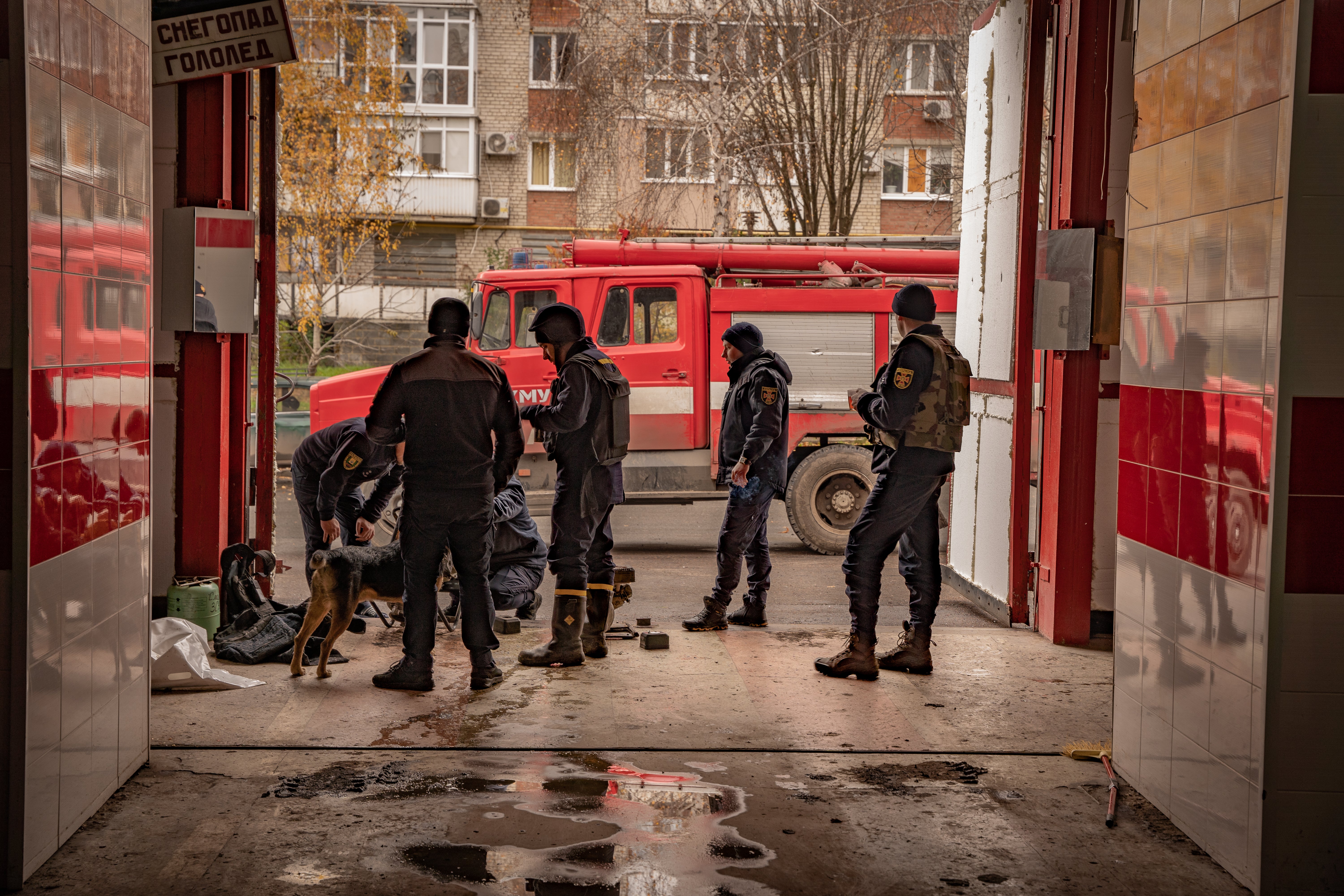
The toughest situation they went through occurred in August. Russia hit a tower block killing 48 people, Nikata says. They were digging through the rubble for three days and miraculously managed to find a dozen people alive.
“Because so many members of staff and equipment have been evacuated we have figured out an efficient small team with only a handful of fire trucks,” Nikata continues.
“What keeps me going? My son gives me strength.”
Kroha, en route to Kramatorsk with the critically injured patient, gets a call telling her to turn around and return to the clinic, as more wounded have just come in.
On the side of the road, she is forced to transfer the man, whose skin is turning a hollow pale, to another ambulance to continue his journey.
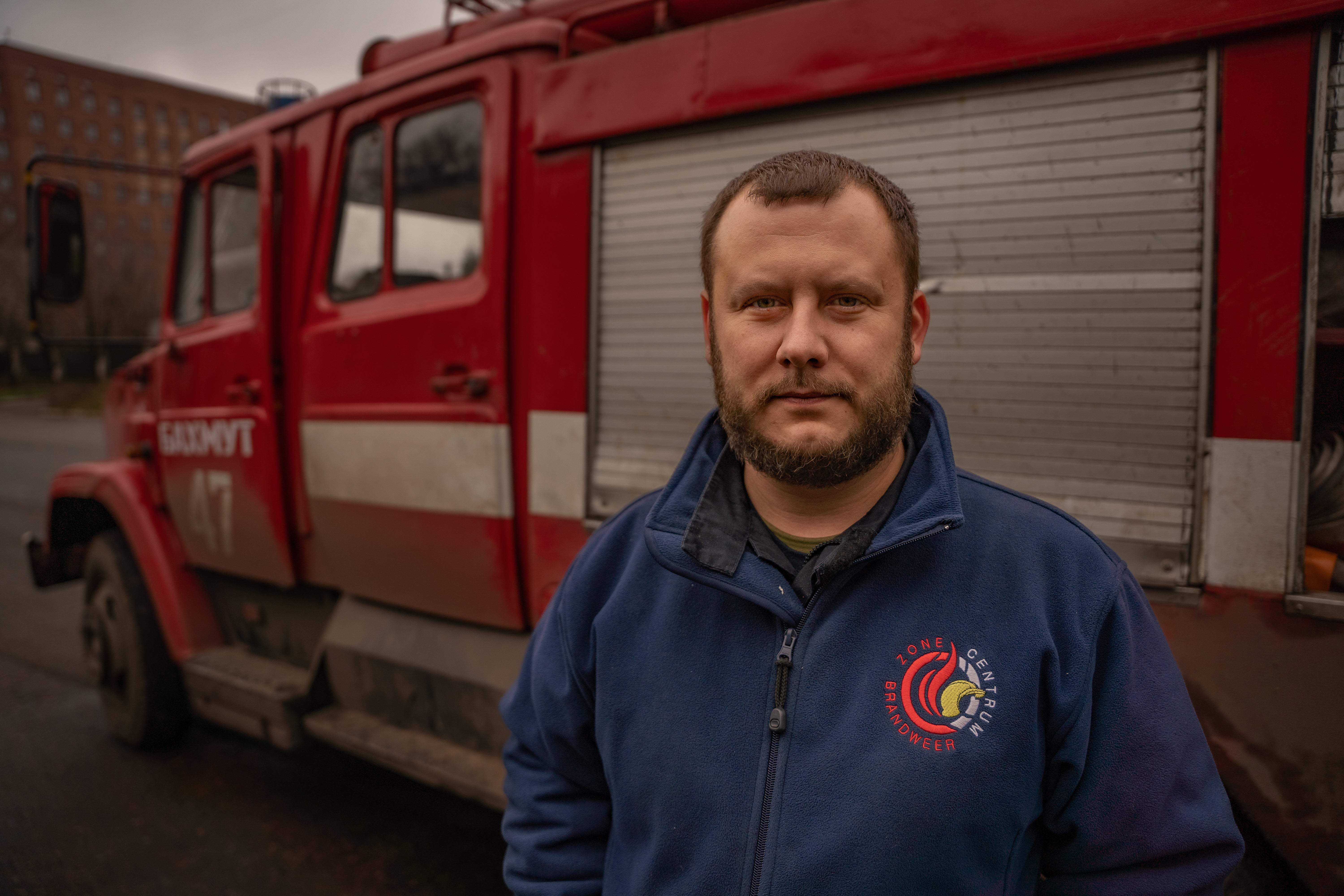
But his condition is deteriorating fast. Later The Independent learns he did not make it, dying on the road.
This, Kroha says, is the soul-crushing reality of the job. There is not even time to mourn; the injured keep coming in.
“This is the pace we work out now,” she adds quietly as she hastily washes the blood off the gurney before returning to base. “We just have to keep going.”
For the Bakhmut fire department, it is about keeping the men’s spirits up so they too can keep working. That is why Galich says he refuses to go home or be cycled out, instead living in the fire station “to give the men courage”.
He sees this new reality as a temporary purgatory. He refuses to mark the passage of time spent trudging through this bloody war.
“On my desk is a calendar which is still stuck on 23 February. I’m leaving it like that until the war is over,” he says, the boom of incoming splintering the air behind him.
“For me, it’s still 23 February. The day before the war started. I want to keep it that way until this nightmare is over and we can wake up.”
Join our commenting forum
Join thought-provoking conversations, follow other Independent readers and see their replies
Comments